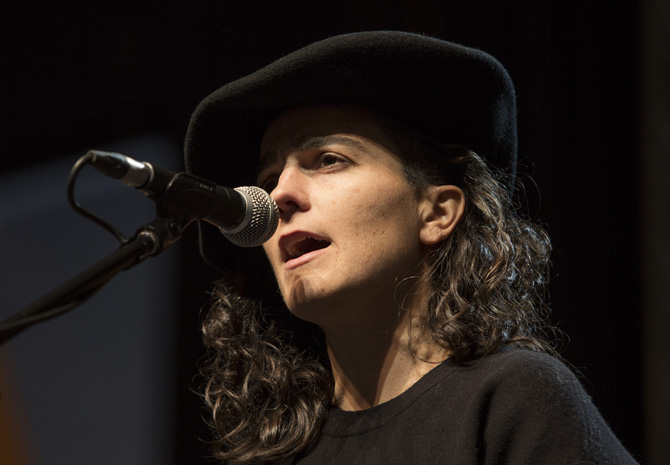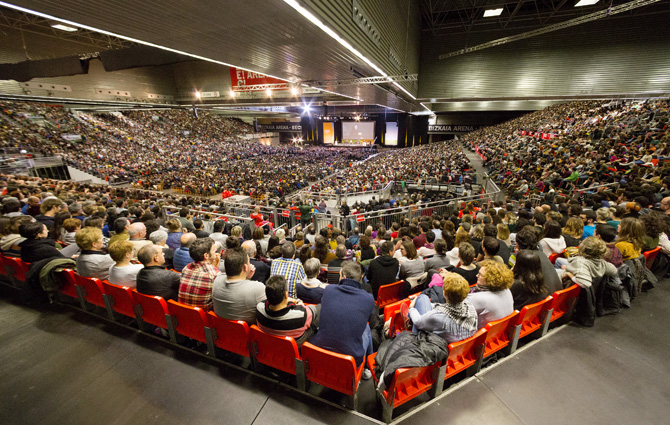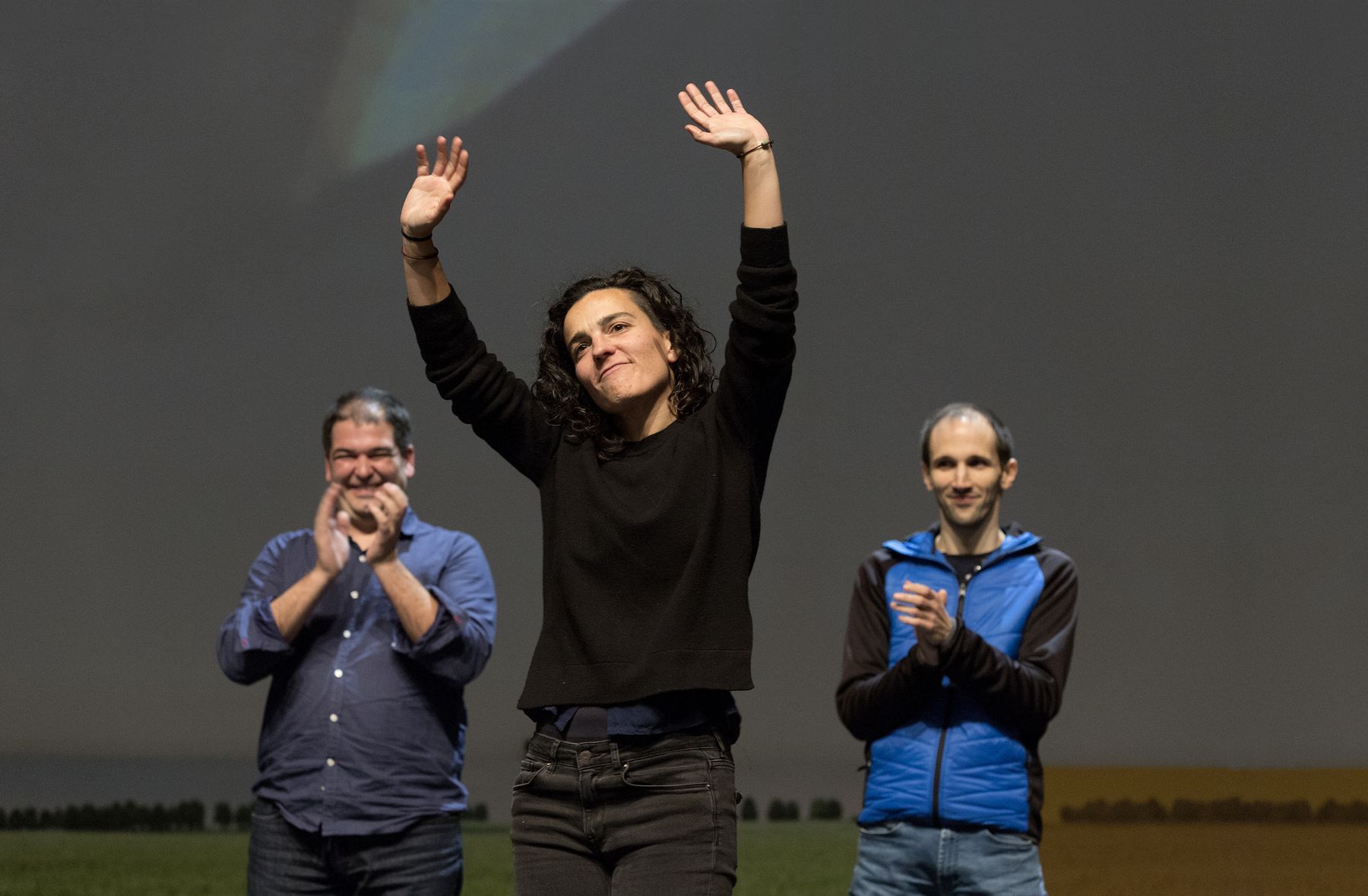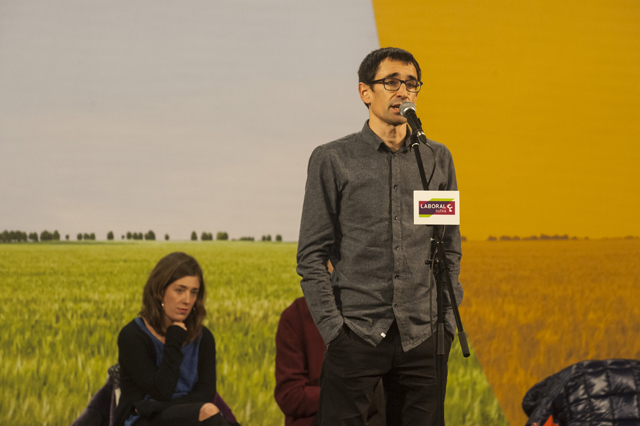Tarima grooves
- We suspected it, but this year’s National Championship has confirmed to us: the bertso gives for the debate. In September, we distributed the cake, half of the chronicles for Kattalin Miner, the other half for Kepa Matxain. Since then everyone has been on their own, and now, at the end of the day, we have met again to have a peaceful conversation on the issues that have come out here and there. Then we leave you what we have recovered from verbal boredom for almost an hour.
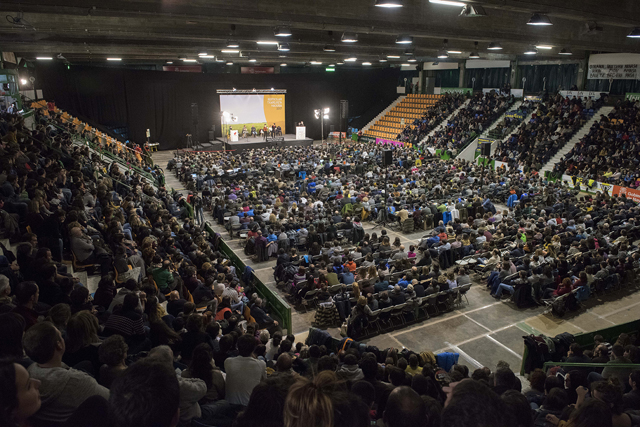
What general impression does this year’s Championship have?
Kepa Matxain: "Much of the script is written beforehand. That's why the most beautiful moments often emerge when the bertsolaris get out of that corset."
Kepa Matxain: I think there's a very large preset corset. Starting with the themes, it's very clear how to sing in each exercise: from the big zortziko, from the serious one, from the small one, from the frivolity, until in the point answers you save whatever you can, from the point of view of the small or the short of six, with the greatest possible reasons, and in jail with the epic in abundance. Much of the script you can expect from each session is written beforehand. That’s why the most beautiful moments often emerge when Bertsolaris seek the counterpoint or get out of that corset. For example, Sarriegi was invented in the prisons of Irun and Pamplona/Iruña. He sewed three great verses, from humor, demonstrating that humor also serves for jail, which doesn't have to be reserved for the zortziko txiki.
Kattalin Miner: "Often the listener is thirsty in humor, but it's been understood that you can't ask too much humor in a tournament, and then, with the slightest blow, the program bursts."
Kattalin Miner: I think sometimes we are very demanding and other times we ask for very little to the championship. Because with humor, for example, I think the audience is often thirsty in humor, but it's been understood that you can't ask too much of humor in a championship, there are other places for that, and then, with the slightest blow, the program bursts. We should know how to read that.
What exercise does a review need?
K. Miner: Punka is an exercise that you can walk loose in the square. In competition I do not know if it makes the same sense, because you have to get the rima right, give the relevant answer, and so, the memorable programs never come out. Yeah, when they're good, they're very good.
K. Matxain: What I find most obvious is that of the points that have been answered. It is clear that the current point response format does not work. It serves the plaza, where bertsolari gets the points that have to do directly with his life. The public knows bertsolari, knows which world it comes from, understands the code, and the exercise works. In the competition, however, it is understood that it is not fair to put personal issues as points, as imbalances may arise, and points on general topics are proposed as solutions, with phrases for “rich and poor”. Almost the only way to respond to a particular point is to make the point itself ridiculous. I don't know what the solution is. It may be necessary to put more personal, even unfair, points of style on the square. Or maybe you have to think about whether that exercise has room in competition, I don't know. But we have to talk about it.

Trades from the same or different position?
K. Miner: We say that the work of the judges is ungrateful and that it is not easy for the authors of the subjects, but there are comments: on big zortziko issues, for example, the bertsolaris have started to put themselves in two different positions, and less badly! Because before -- all that was appreciated was the ability of bertsolari to get some of it out. Instead, I'm enjoying the issues of jail. For example, the smell that was put in Amurrio. I thought, How has this issue not been raised before? The description of the smell through an image and orality gives a lot of play. That's why they came out with such good verses.
How is the tension between discourse and technique?
Kattalin Miner: "If the championship is an expression of our cultural idiosyncrasies and we attribute to the Bertsolaris a kind of representation of ours, we must ask them to contribute also discursively"
K. Miner: Here the main question is: Does the speech score? Still now, there's a good score on the form, and of course, we're in the competition, but there's a clash, for example. Furthermore, if we take the championship as an expression of our cultural idiosyncrasy and attribute a kind of representation to the Bertsolaris, we must ask them to make a discursive contribution as well. To what extent does this serve to enter BEC? Does bertsolari have to fill everything to wear the txapela? It's another debate.
K. Matxain: It is essential to keep the chip of the speech on, to realize what strengthens the message that is thrown from the micro, what it calls into question. In addition, lately I notice a lot of voices looking at bertsolarism from that point of view. But although the “form of substance” debate serves to explain some things, I find it too rigid from one point, because what says something different de facto is saying something different. For example, I didn't like Maule's session. Examining discursively, I did not see any inappropriate message or error. Why didn't I like it? It was precisely because I missed something other than a speech. Another example: Why are the verses that Lujanbio left in Irun prison good? Why did he raise the issue of transgender? Or because he had said what he had said, as he had said? It's interesting for me to put the focus there, because otherwise it looks like we're judging a pamphlet, and the verse, if it's going to be good, can't stay on the pamphlet.
K. Miner: There is also a great fallacy, and that is to think that they win applause for chanting a topic that is “fashionable” in society. That is not the case. You can get the issue out of racism and not reach anyone, because you haven't made it credible, because you haven't created empathy, because you haven't displaced the listener from his seat, and that's why he's not going to earn more points. There must be a danger, not throwing the empty pamphlet. You need to bring the receiver to a place where it's not positioned otherwise. Lujanbio did something else with the transgender theme: he surprised the listener through his characters. “If it’s not what I thought, what do I have in front of me?” The images of the program show how throughout the three verses the listener's head bursts. Not only has he talked about the experiences of this transgender into the first person, of all his traumas, but he has given the listener the opportunity to play. And so, he's done a very naive thing discursively. Is it worth scoring? Yes, but to do so, not just to take it out.
K. Matxain: I can easily imagine a verse as bad as I'm going on transgender. The merit of Lujanbio was that he found a little bit of edge on the subject, but next time he can find him singing about the foster children, about the cardinals of the Vatican or about the Self-Government Report.

Should any judgement criteria be changed?
K. Matxain: I think convenience is rated high. They sew verses without slips, but at the same time, the low-gloss achieves points. On the contrary, someone can try to say in a verse something that goes beyond the obvious, without completely rounded it up. The first is scored more than the second. I think a little bit of generosity is due to the person who takes the risk. Instead of rewarding not falling, you have to reward the attempt to succeed, because otherwise, you win mediocrity.
Are credible characters built?
K. Miner: The risk is absolutely linked to credibility. Like Nerea Ibarzabal, getting into a child's skin and lowering the argument to a minimum, saying, "Because you've eaten too much," that's risky. It's easier to put ourselves in the role of a child and say what we would say. I would put on the counterpoint the Bertsos of Amurrio of BEÑAT Gaztelumendi, who were certainly very good, but the thoughts of a 7-year-old were not the same. The verses were terrible, the situation was very well described, but if it was not a little bit to put into the mouth of another what we mean. It is legitimate and what can be done, but it is a question of credibility. And with Laburu’s t-shirt, Ditxosozko’s shirt too, to what extent he built a character worthy of faith to say that or not…
Kepa Matxain: "The reaction of the listener interferes with bertsolari and, then, the listener becomes emitter, his applause, his whistle, his laughter, etc. It's a two-way communication, which also happens all of a sudden. Under these conditions, making a pure fiction is very difficult."
K. Matxain: This debate gave rise to a great deal. It gave me the doubt as to how much fiction in verse is possible. Some emphasized that the painter's role was a role and, therefore, Laburu referred to fiction. I am not convinced by this argument. If a large majority of the listeners understood that at that time Laburu was singing – and not a baffling – I find it sufficient proof to say that the argument of fiction in verse is not worth so much. Because, in bertsos, the listener is an essential piece. Bertsolarism cannot be recognized as much autonomy as any film, novel or something that can mature with all the time of the world. The basic outline of the communication reads: “issuer – message – receiver”. Bertsolari is the emitter, the message is the bertso and the receiver is the listener. But at the same time, the listener's reaction interferes with bertsolari, and then the listener becomes the emitter, his applause, his whistles, laughs, etc., and the receiver is bertsolari. It's a two-way communication, which also happens all of a sudden. Under these conditions, making a pure fiction is very difficult.
K. Miner: On many occasions, it seems like criticizing that is anti-humor. And no, I love humor, but I think it's just humor.
Kattalin Miner: "To make good humor, ethical, political, it has to be what has been agreed between equals, or whatever is above. On the contrary, we are strengthening the power relations that already exist"
That in order to be good, or to be ethical, or political, it has to be or agree among equals, or from bottom to top. In other words, a homosexual can laugh at a hetero or a homophobe, but on the contrary, we are reinforcing the power relations that already exist. We must be polite with conscience and political responsibility.
What importance should be attached to the points?
K. Matxain: There is an opinion that is heard here and there, which says “well, yes, this is a championship, but the competition is something of the second level. Let’s look at the cultural creation it leaves.” The attempt to denaturalise competition squeaks me out for many reasons. Needless to say, there is someone who takes care of good jobs. In any case, talking about points is not understood as sport.
Kepa Matxain: "The dots are another sample of the old canon. How won't it be interesting to talk about it? It seems to me a desire to avoid this, a desire to avoid a necessary debate"
pure logic. The points give rise to a thousand readings. What's a high score? How low? Why? The dots are a sample of the old canon. There are seven judges, seven heads who have thought a lot about Bertsolaris, putting a number on a bertso. How won't it be interesting to talk about it? It seems to me that it is a desire to avoid this, a desire to avoid a necessary debate.
K. Miner: It is also an assessment with a total ideological burden. We all recognize that being objective is impossible... for let us talk about that subjectivity! And let's look at what he's valuing. And, to have a guarantee, let's put judges of different subjectivities in it. Let us first put women and men, half and half. Or people of different ages -- so will balance subjectivities, and
Kattalin Miner: "We all recognize that in judgment it is not possible to be objective… for let us talk about that subjectivity! And, to have a guarantee, let's put judges of different subjectivities."
There will be a guarantee that the various bertsolaris will be included in the items. Because now we assume subjectivity, but one subjectivity wins everyone else. This is very dangerous, because there will always be someone who does not comply with that canon.
How has it been to be a chronicler?
K. Miner: For me it was a new exercise and I started to be happy, but I recognise that I have been chained in recent times, because I have had a hard time criticising, saying or emphasising a few things. I thought that having difficulty criticizing was something that only happened in the Basque literature, but I realized that in the Bertsos it is even more difficult, and that has made me make chronicles worse. It's a small world, you have great appreciation for people, and many times you want to say one thing and you can't. I do not like firewood, but I am in favour of discussions coming out on the table and I have been tied to myself in making the criticism, because I realized that what I was saying was going to be read with magnifying glass. If I haven't been myself, like the bertsolaris in the competition, wrapped up.
K. Matxain: I try to do what I would like to read. As a reader, if I need five minutes to read a chronicle, I like it when the journalist leaves his mark. Of course, if you move, there's always a risk that people don't like it, or that they offend you. Even knowing this, I think we should be honest with ourselves and try to say what we think.
K. Miner: Criticism and comments are everywhere. The championship par excellence is polemical in itself, but when it launches into public space, it becomes ugly. How are we going to create a critical speech, if you're afraid it's going to be hosted personally or not? Sometimes it can happen and do harm, it's true, we're the people behind everything, but can you debate a cultural event of these dimensions?
K. Matxain: It is true that positive criticisms are spreading in an impressive way, and that the least positive ones are silent. It seems that the most normal thing would be for us to flatter each other, and if someone points something, for example, or calls themselves debaldo himself or has some personal issue with which he has pointed out. These symptoms remain. It is true that the minimum required of the critic is respect. But from the moment that is the case, they should be taken with a little sportiness. In any case, those who have surrounded me have come to me very willingly, and in that sense I am at ease.
I still have to digest BEC. What a great ending the octet has given us! It starts and ends. Thank you very much and thank you very much, you have made us live a great day!
I am therefore very pleased, very pleased that I had taken off the crackles left by the championship on... [+]
Abenduaren 17an Barakaldoko BECen jokatu zen finala, Dani Blancoren iruditan.
Abenduaren 17an BECen jokatu zen Txapelketa Nagusiko finalaren kronika. Sailkapen taulak hau esan zuen: Maialen Lujanbio txapeldun 1.756 punturekin. Aitor Mendiluze bigarren, buruz burukoa Lujanbiorekin eginda, 1.680,5 punturekin. Hirugarren Sustrai Colina 1.137,5 punturekin... [+]
Abenduaren 17an BECen jokatu zen Txapelketa Nagusiko finalaren kronika. Sailkapen taulak hau esan zuen: Maialen Lujanbio txapeldun 1.756 punturekin. Aitor Mendiluze bigarren, buruz burukoa Lujanbiorekin eginda, 1.680,5 punturekin. Hirugarren Sustrai Colina 1.137,5 punturekin... [+]
Barakaldoko BECerako lau sarrera zozkatu ditugu ARGIA JENDEAren artean. Ondarroa eta Iturenera joan dira sarrerak.
Barakaldoko BECerako lau sarrera zozkatuko ditugu ARGIA JENDEAren artean. Bi sarrera bikoitz izango dira.
Abenduaren 17an 11:00etan hasiko da Txapelketa Nagusiko Finala. Zortzi bertsolariak erabakita daude: Unai Agirre izango da finaleko aurpegi berria eta Maialen Lujanbio beteranoena, seigarren aldiz jokatuko baitu. Orain arte txapelketan entzun ez dugun Amets Arzallus egungo... [+]
Abenduaren 2an Iruñean jokatu zen finalaurrekoaren kronika. Sailkapenak hau zioen: Aitor Sarriegi (698,5 puntu), Aitor mendiluze (696,5), Unai Agirre (696), Miren Amuriza (652), Alaia Martin (649,5) eta Oihana Iguaran (646).









